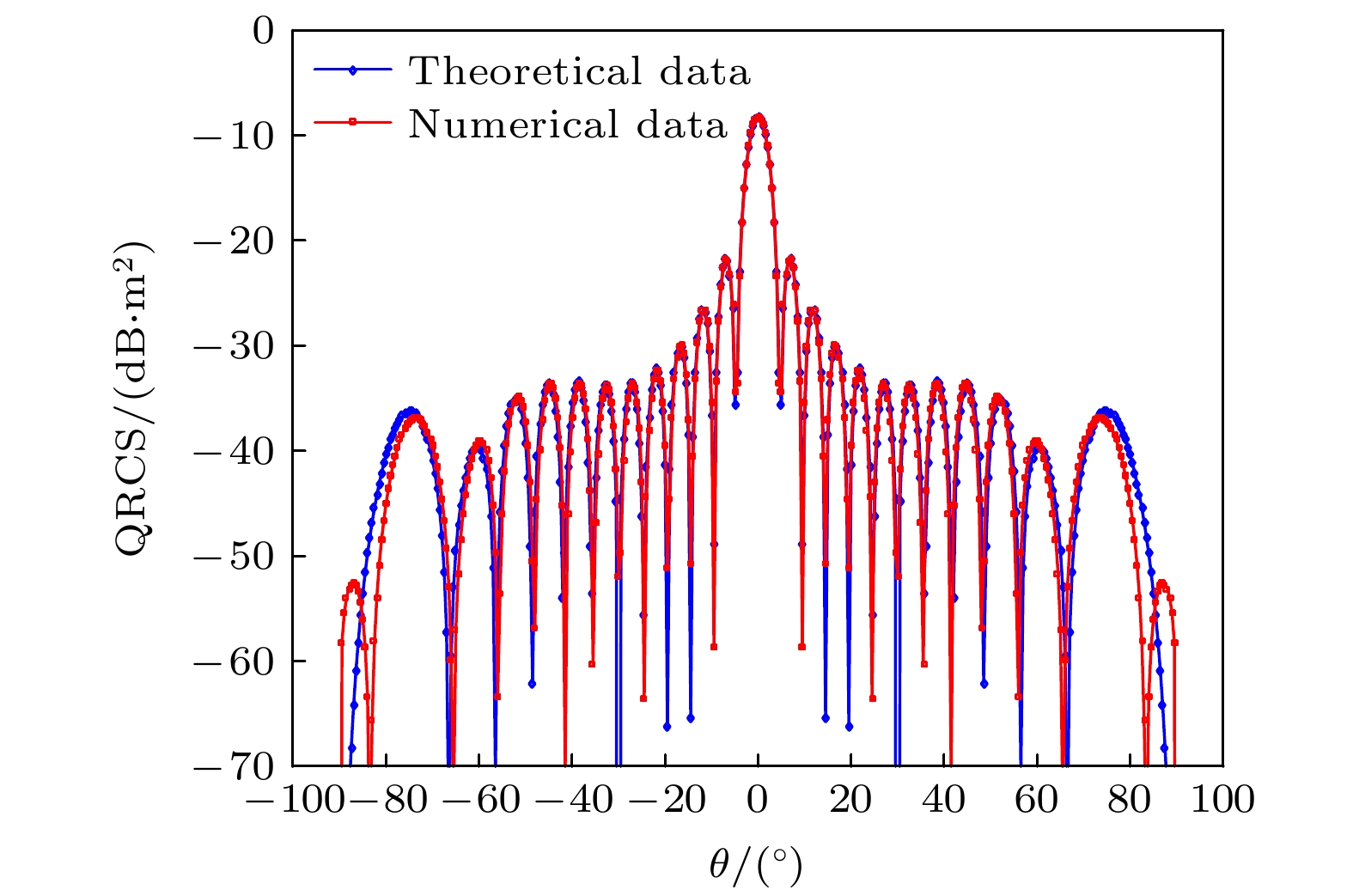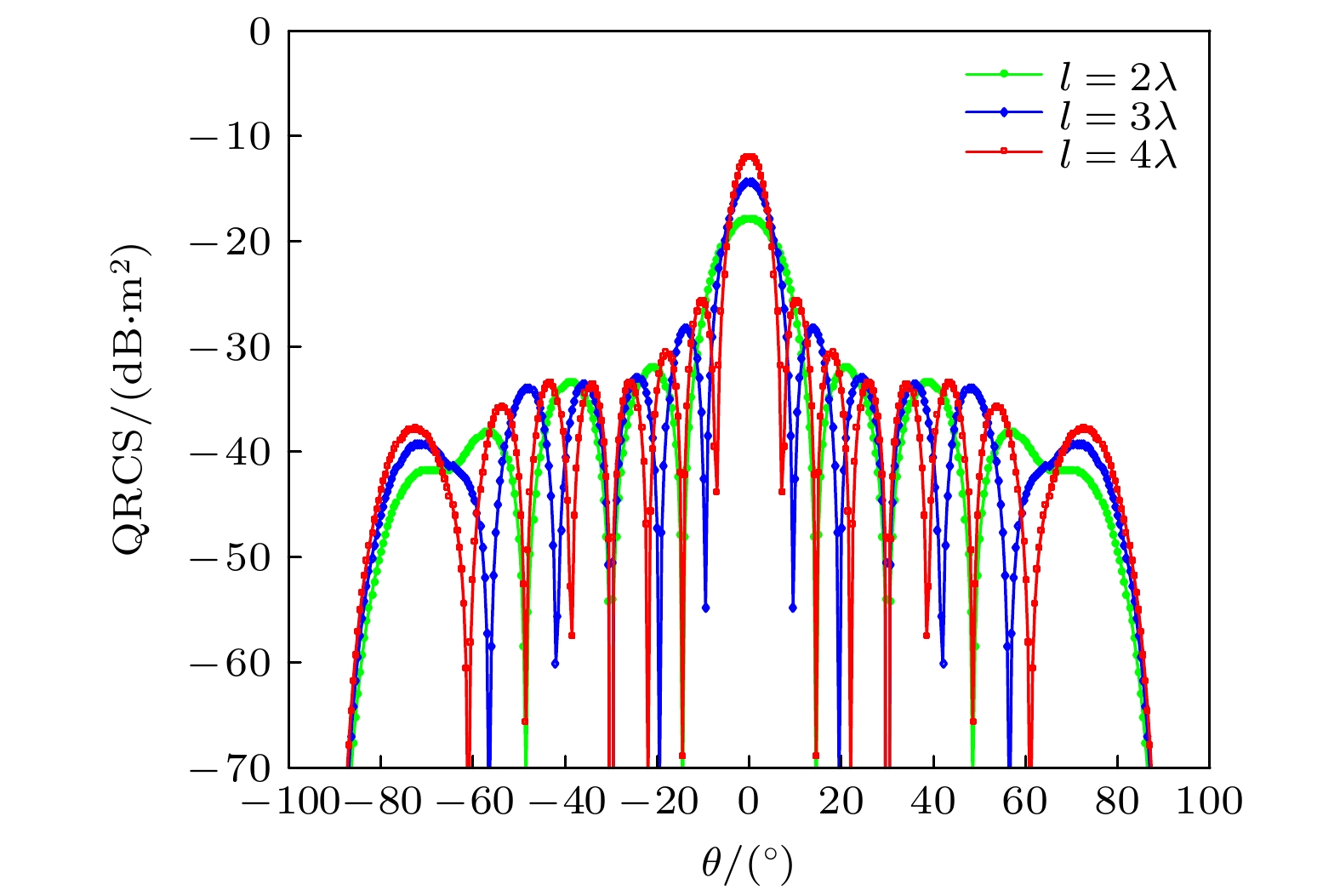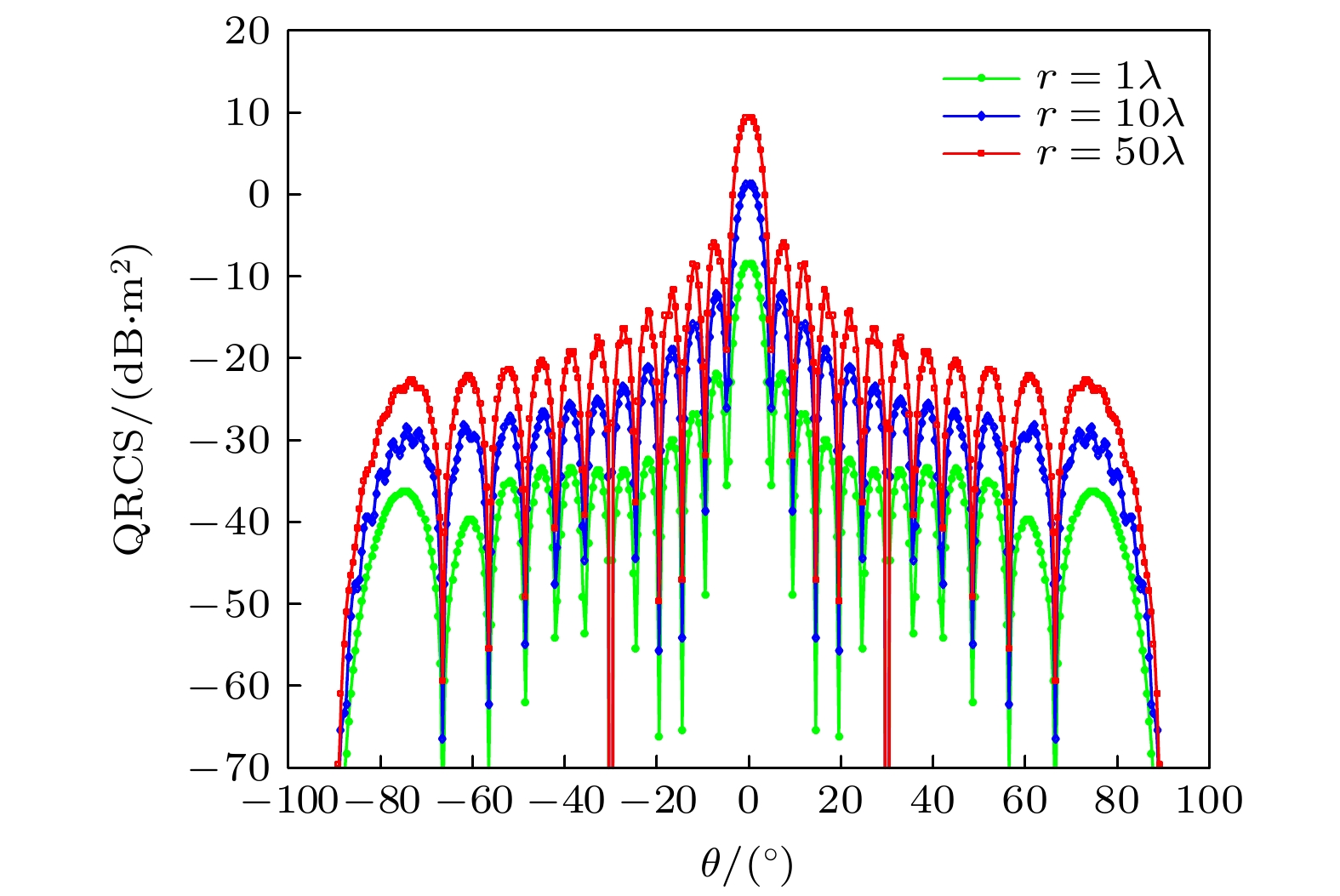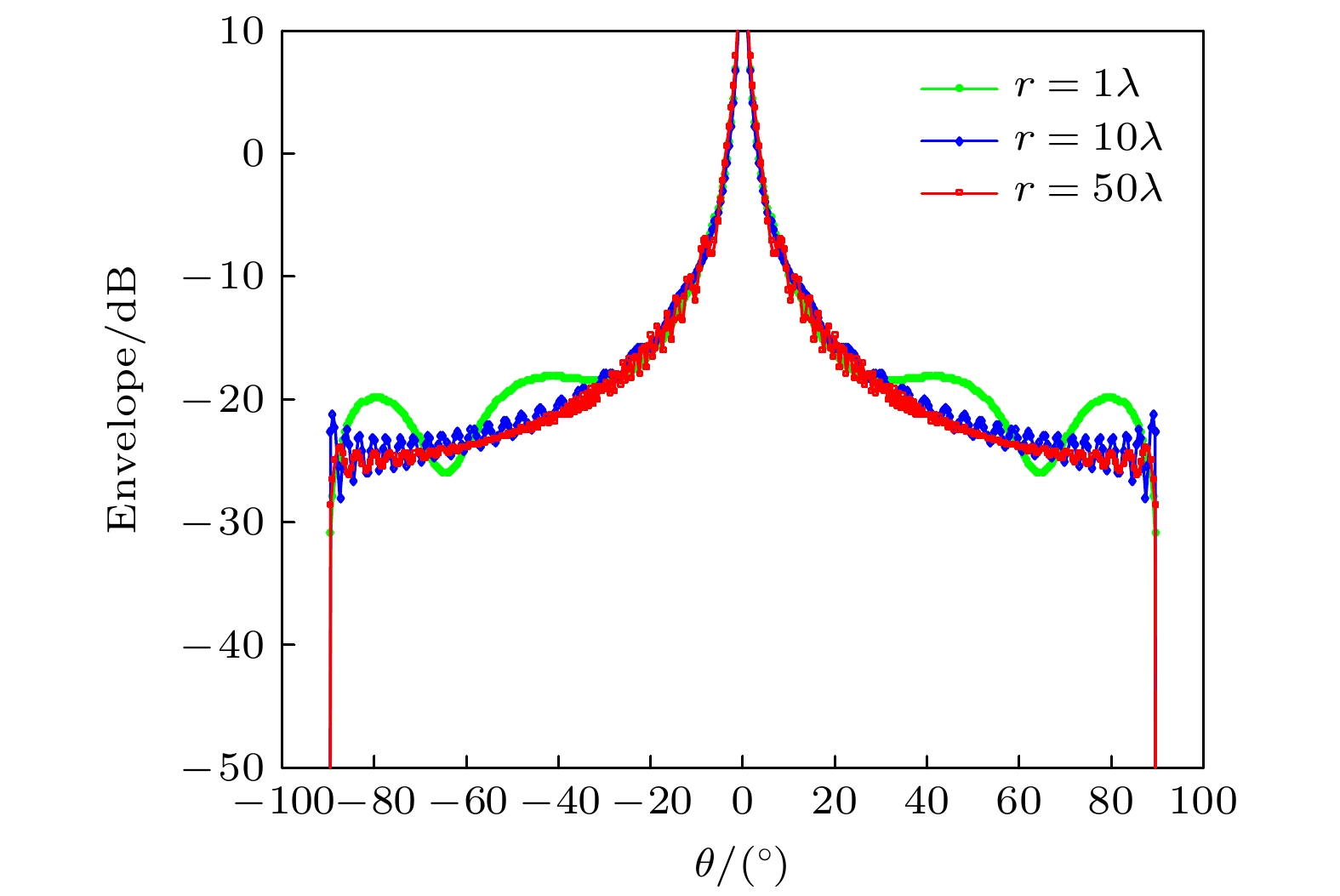-
为研究圆柱曲面的单光子量子雷达散射截面与经典雷达散射截面相比存在的具体优势, 引入光子波函数, 将引起量子干涉的距离矢量进行分解, 通过圆柱曲面的曲面积分推导得到了单基地单光子下的圆柱曲面量子雷达散射截面的封闭表达式. 分析了不同电尺寸的圆柱曲面长度和曲率半径的影响, 对比了圆柱曲面量子雷达散射截面与经典雷达散射截面的封闭表达式. 封闭表达式的分析和仿真结果都表明, 圆柱曲面长度的电尺寸决定量子雷达散射截面的旁瓣数, 曲率半径的电尺寸决定了量子雷达散射截面曲线的包络, 量子雷达散射截面的整体强度与曲率半径的电尺寸呈线性关系. 圆柱曲面的量子雷达散射截面与经典雷达散射截面相比具有旁瓣增强的优势, 有利于隐身目标的探测.To examine the single-photon quantum radar cross-section of cylindrical surface and its specific advantages over the classical radar cross-section, a photon wave function in which the distance vectors causing interference are decomposed is introduced in this study. A closed-form expression of the single-photon quantum radar cross-section of cylindrical surface is derived. The influences of the length and curvature radius of cylindrical surfaces with different electrical sizes are analyzed, and the closed-form expressions of the quantum and classical radar cross-sections of cylindrical surface are compared with each other. The analyses of the closed-form expression and simulation results show that the electrical length of the cylindrical surface determines the number of side lobes of the quantum radar cross-section; meanwhile, the curvature radius has a linear relation with the overall strength of the quantum radar cross-section, and the electrical size of the curvature radius determines the envelope of the quantum radar cross-section curve. Compared with the classical radar cross-section, the quantum radar cross-section of a cylindrical surface has the advantage of side-lobe enhancement, which is beneficial for detecting stealth targets.
-
Keywords:
- quantum radar /
- cylindrical surface /
- quantum radar cross section /
- quantum detection
[1] Jiang K, Lee H, Gerry C C, Dowling J P 2013 J. Appl. Phys. 114 2733
 Google Scholar
Google Scholar
[2] Lloyd S 2008 Science 321 1463
 Google Scholar
Google Scholar
[3] Lanzagorta M 2010 SPIE Photonics Europe, Brussels, April 12−16, 2010 p77270
[4] Brandsema M J, Narayanan R M, Lanzagorta M 2017 Quantum Inf. Process. 16 32
 Google Scholar
Google Scholar
[5] Brandsema M J, Lanzagorta M, Narayanan R M 2020 IEEE Aero. El. Sys. Mag. 35 58
 Google Scholar
Google Scholar
[6] Kang L, Xiao H T, Fan H Q 2014 Chin. Phys. Lett. 31 034202
 Google Scholar
Google Scholar
[7] 徐世龙, 胡以华, 赵楠翔, 王阳阳, 李乐, 郭力仁 2015 64 154203
 Google Scholar
Google Scholar
Xu S L, Hu Y H, Zhao N X, Wang Y Y, Li L, Guo L R 2015 Acta Phys. Sin. 64 154203
 Google Scholar
Google Scholar
[8] Fang C 2019 IEEE Sensors J. 20 2348
 Google Scholar
Google Scholar
[9] Fang C, Hui T, Liu Q F, Li T, Long X, Chen Y J, Liang H 2018 IEEE Photon. J. 10 1
 Google Scholar
Google Scholar
[10] 徐泽华, 李伟, 许强, 郑家毅 2018 光子学报 47 141
 Google Scholar
Google Scholar
Xu Z H, Li W, Xu Q, Zheng J Y 2018 Acta Photon. Sin. 47 141
 Google Scholar
Google Scholar
[11] Liu K, Xiao H, Fan Q 2014 IEEE Photonics Technol. Lett. 26 1146
 Google Scholar
Google Scholar
[12] 陈坤, 陈树新, 吴德伟, 王希, 史密 2016 光学学报 36 1227002
 Google Scholar
Google Scholar
Chen K, Chen S X, Wu D W, Wang X, Shi M 2016 Acta Opt. Sin. 36 1227002
 Google Scholar
Google Scholar
[13] [14] Fang C 2017 IEEE Photon. J. 10 1
 Google Scholar
Google Scholar
[15] [16] Fang C 2019 IEEE Access 7 141055
 Google Scholar
Google Scholar
-
-
[1] Jiang K, Lee H, Gerry C C, Dowling J P 2013 J. Appl. Phys. 114 2733
 Google Scholar
Google Scholar
[2] Lloyd S 2008 Science 321 1463
 Google Scholar
Google Scholar
[3] Lanzagorta M 2010 SPIE Photonics Europe, Brussels, April 12−16, 2010 p77270
[4] Brandsema M J, Narayanan R M, Lanzagorta M 2017 Quantum Inf. Process. 16 32
 Google Scholar
Google Scholar
[5] Brandsema M J, Lanzagorta M, Narayanan R M 2020 IEEE Aero. El. Sys. Mag. 35 58
 Google Scholar
Google Scholar
[6] Kang L, Xiao H T, Fan H Q 2014 Chin. Phys. Lett. 31 034202
 Google Scholar
Google Scholar
[7] 徐世龙, 胡以华, 赵楠翔, 王阳阳, 李乐, 郭力仁 2015 64 154203
 Google Scholar
Google Scholar
Xu S L, Hu Y H, Zhao N X, Wang Y Y, Li L, Guo L R 2015 Acta Phys. Sin. 64 154203
 Google Scholar
Google Scholar
[8] Fang C 2019 IEEE Sensors J. 20 2348
 Google Scholar
Google Scholar
[9] Fang C, Hui T, Liu Q F, Li T, Long X, Chen Y J, Liang H 2018 IEEE Photon. J. 10 1
 Google Scholar
Google Scholar
[10] 徐泽华, 李伟, 许强, 郑家毅 2018 光子学报 47 141
 Google Scholar
Google Scholar
Xu Z H, Li W, Xu Q, Zheng J Y 2018 Acta Photon. Sin. 47 141
 Google Scholar
Google Scholar
[11] Liu K, Xiao H, Fan Q 2014 IEEE Photonics Technol. Lett. 26 1146
 Google Scholar
Google Scholar
[12] 陈坤, 陈树新, 吴德伟, 王希, 史密 2016 光学学报 36 1227002
 Google Scholar
Google Scholar
Chen K, Chen S X, Wu D W, Wang X, Shi M 2016 Acta Opt. Sin. 36 1227002
 Google Scholar
Google Scholar
[13] [14] Fang C 2017 IEEE Photon. J. 10 1
 Google Scholar
Google Scholar
[15] [16] Fang C 2019 IEEE Access 7 141055
 Google Scholar
Google Scholar
计量
- 文章访问数: 6268
- PDF下载量: 92
- 被引次数: 0













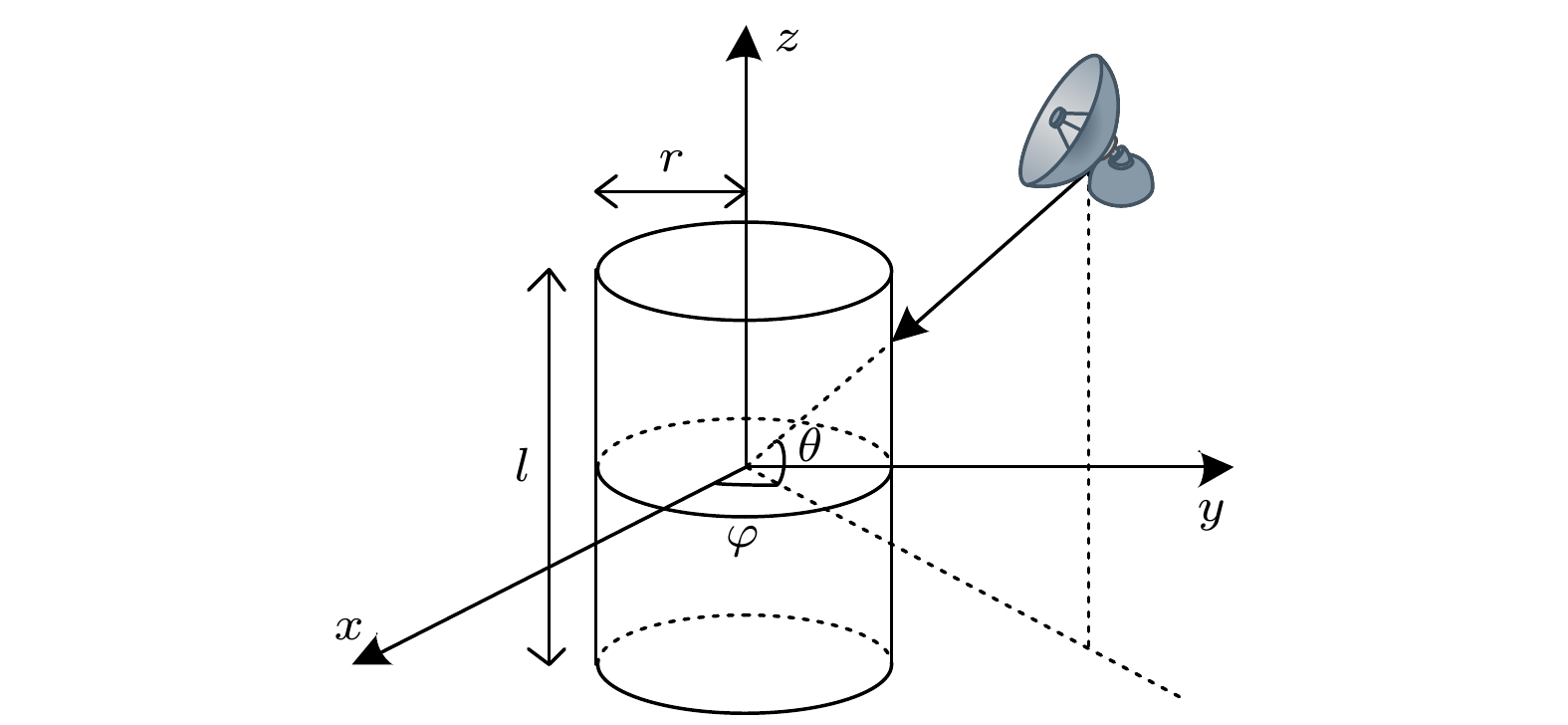
 下载:
下载:

